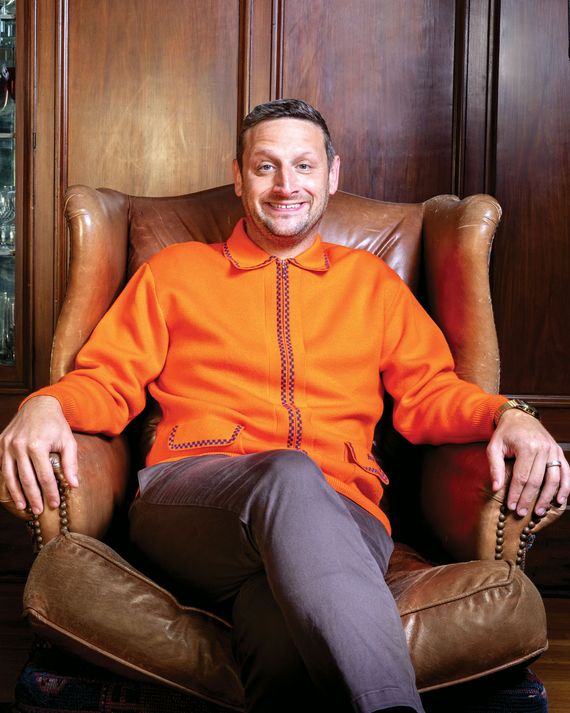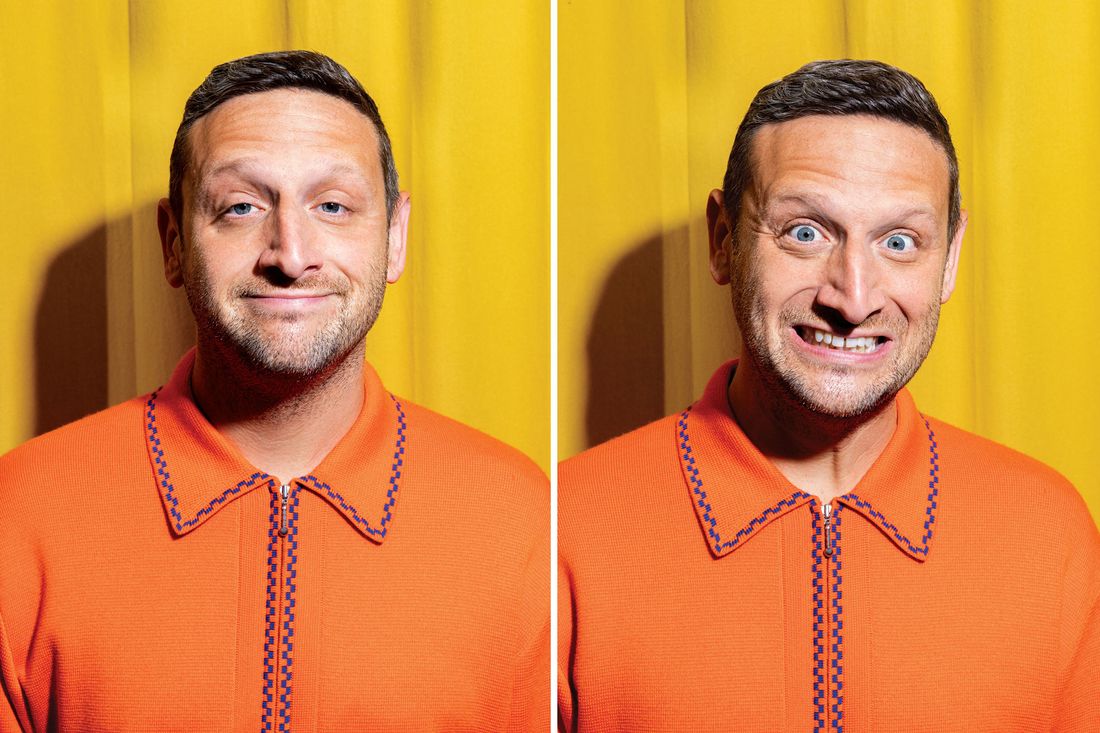
Six minutes into my conversation with comedian Tim Robinson, creator, writer, and performer of the Netflix sketch show I Think You Should Leave, my 4-year-old charges into my office and bellows, “I need to go potty!” I’d been trying to seem relaxed, having been thoroughly warned — by a publicist, by other journalists, by his own colleagues — that Robinson does not enjoy press, and has a history of “sinking into nothing” during interviews. He was polite and tense when I introduced myself; when he sees my daughter, a huge grin spreads across his face. She demands to show Robinson a stuffed animal. “I’d love to see it!” he says. He looks thrilled at the prospect of hanging out with my kid rather than grimly staring down the barrel of questions like “So how do you define your comedic sensibility?”
Robinson’s work is a shrine to the glories of interruption. His most indelible characters on I Think You Should Leave, which he created with his writing partner, Zach Kanin, are those who barge into scenes, double down on their own disruption, and lean heavily on toilet material. Although the show’s sketches can fly to absurdist, surrealist heights, its bread and butter are everyday social settings ruled by widely understood norms — corporate offices, casual parties with friends, baby showers, funerals — and the defensive jerks, idiots, iconoclasts, and well-intentioned dinguses who cannot stop themselves from making things weird. Its spectrum of moods is small and well defined, but within that, there’s a universe full of people who do not know, or simply do not care to know, when they should stop. Those characters have often been portrayed by guest actors like Sam Richardson, Vanessa Bayer, and the late Fred Willard, but they’re just as often played by Robinson himself.
“That Schadenfreude that you experience is almost a little too much because you want Tim to be okay,” says comedian Keegan-Michael Key, who has known Robinson since the early aughts. “He doesn’t want to be a loser, and yet he allows himself, he allows those characters to go through the gauntlet of emotions of trying to get to the other side of that. And often they don’t.”
In the two years since I Think You Should Leave’s first season appeared on Netflix, Robinson’s face and clips from the series have proliferated on the internet. The show quickly became popular among sketch-comedy fans, but it was the eerie resonance between Robinson’s work and the political climate that boosted it into broader visibility. The most familiar image is one of Robinson dressed in a hot-dog suit, his arms spread wide, his expression a portrait of unconvincing persuasion, with the caption “We’re all trying to find the guy who did this.” (In the show, the Hot Dog Guy has just crashed his hot-dog-shaped car into a store.) It became an unavoidable meme of the Trump era, used in response whenever Trump or other politicians uttered bald-faced lies to cover up their own actions. “I cannot help but think of this sketch,” MSNBC’s Chris Hayes said after the attempted insurrection on January 6, comparing the Hot Dog Guy to Ted Cruz.
With its second season arriving on Netflix July 6, I Think You Should Leave is poised to surge into cultural ubiquity, with Robinson as the face of a distinctive, defensive, and often embarrassing strain of American identity. And yet, no one could be less interested in owning a huge political stage. Robinson does not want to get into a detailed breakdown of how he came up with Hot Dog Guy, or any of the sketches, really. He is charming during our conversation, but he mentions more than once that he deals with anxiety, especially in a circumstance like this one, where he worries he might say the wrong thing. He does not enjoy the task of pulling apart exactly what makes his work so funny. He says that Kanin came up with the show’s name, inspired by the characters Robinson often plays: “We talked about how, when I did sketch comedy, there’s always a point [in the scene] where somebody says, ‘Look, I think you should leave.’ Because there’s always one person who’s a problem.” Robinson understands that one person intimately. He is drawn to the types who he’s afraid may be him.
Robinson, who is 40, lives in Los Angeles with two kids, two dogs, and his wife, Heather, an electrical engineer he started dating in high school. His friends describe him as deeply loyal with a powerful work ethic. They also describe him as painfully ill at ease. “Tim is always incredibly uncomfortable. He’s a huge hypochondriac,” says Richardson, Robinson’s best friend and a close colleague.
Robinson grew up in the Detroit suburbs of Clarkston and Waterford, Michigan, less than an hour from the Canadian border, and there’s something distinctly midwestern about his characters. “That’s the thing in Michigan,” Richardson explains. “You’re surrounded by a lot of assholes. They’re not as blatantly asshole-ish as you’d see in a bigger city or whatever, but they’re there. And they get very embarrassed. They like to have their lives in certain ways, and if anything doesn’t match that, they fly off the handle.” With the auto industry looming over everything, Richardson says, “you’re given this blueprint to live by, so when things don’t exactly match that, there’s a lot of repressed anger that pushes its way through, years and years and generations in the Midwest just ready to boil over.”
Robinson’s father worked in construction. His mother worked for Chrysler. (His wife also works for Chrysler, which she has continued to do while moving with him across the country.) As a kid, he watched SNL occasionally and a Best of Chris Farley VHS constantly. His proximity to Ontario meant his family’s TV antenna could pick up the Canadian sketch show The Kids in the Hall on CBC, which felt like illicit access to a comedy world few of his classmates knew about; he loved the Bruce McCulloch sketch about a kid who brings home a businessman as a pet. But it wasn’t until his mom took Robinson and his then-girlfriend to the Second City in Chicago when he was in high school that he remembers seeing comedy performed live. After that, Robinson started taking weekend improv classes at the Second City Detroit. “If that had not been there, that accessible, for me to take those classes, I would have never been doing this,” he says.
Key was one of Robinson’s first improv teachers at the Second City Detroit. He remembers Robinson as “an extremely eager student, always wanted to push, always wanted to figure out a little more.” When he graduated, instead of going to college (“I could not afford a college and did not have good grades to go”), Robinson took a job as part of the Second City Detroit’s touring company, which was just a vanful of performers driving to gigs around Michigan. He had never traveled much, and the opportunity to show up and perform for new audiences was, as Robinson tells me, “rad as hell.” He worked side gigs to support himself, including one at a toy store, and started teaching improv — which is how he met Richardson, one of his first students. He eventually moved on to the Second City Chicago. Robinson says now that he never made a conscious choice to pursue sketch comedy instead of any other kind of job. “I think I had the benefit of being young and not understanding life,” he says. “I did have a bit of ‘I’m going to do comedy! I’m going to do comedy.’”
Robinson had never considered SNL as a job he should even try for. But in 2011, John Mulaney saw Robinson perform at Montreal’s Just for Laughs festival and recommended that he be invited to audition. Getting the call that he’d been cast, Robinson says, “was one of the craziest moments of my life.” He began in 2012 as a featured performer, and the first year was rough: He had never worked in front of cameras before, never needed to hit marks and read from cue cards. “The only time where I ever saw Tim doubt himself was his year at SNL, where he was in the cast,” says Richardson, who by this time was appearing on shows like The Office. “Tim, the most confident, funniest person in the world, would call me on Saturday night or Sunday morning after the show, and he’d be like, ‘I don’t know, maybe I’m not supposed to do this.’ I was flabbergasted! What is this place if it could make Tim Robinson feel this way about himself and what he can do in comedy?”
After a year as a writer and a performer, Robinson became solely a writer. “I was struggling,” Robinson says. “And then, once I got main writer, I felt a weight lift off me.” Most crucially, he began working with Kanin, an office mate who shared his sense of humor. Kanin remembers the first character they wrote together that really felt like them, which Robinson performed when he was still a featured player: It was for a “Weekend Update” sketch about a billionaire obsessed with building a full-size replica of the Titanic. “We were like, Oh, we like this character, this kind of guy,” remembers Kanin. “He’s so confident, and yet he’s just, like, on the verge of tears hoping you’re not going to ask him, ‘Why are you doing this?’”
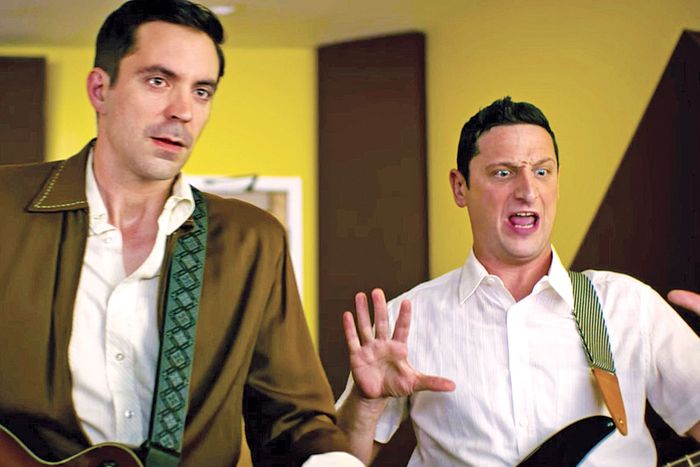
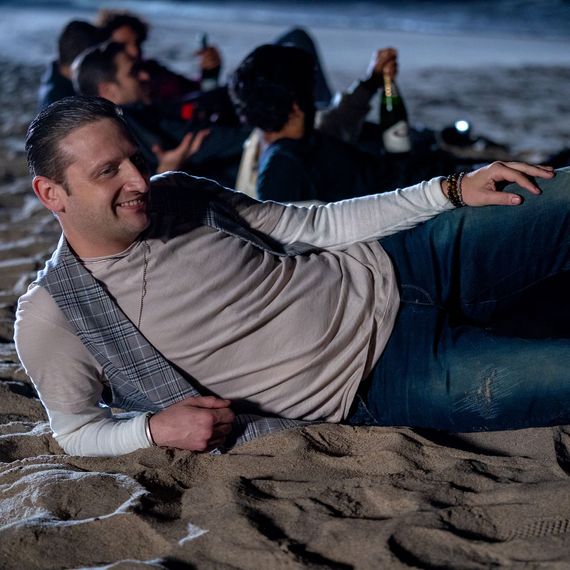
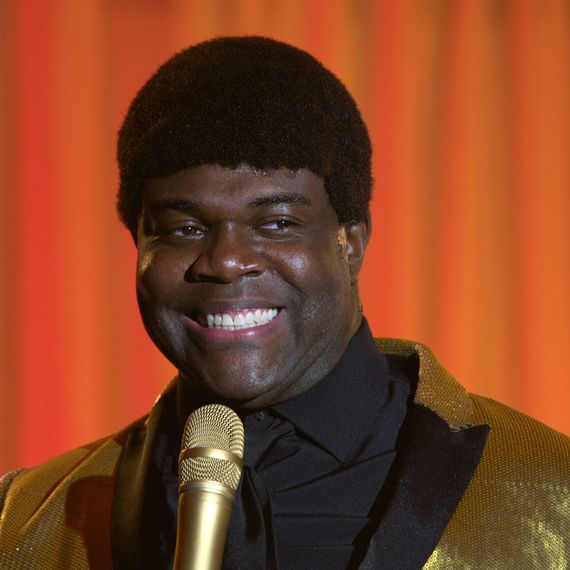
In 2016, Kanin and Robinson left SNL together and, in 2017, created Detroiters, a Comedy Central sitcom starring Robinson and Richardson as partners at an agency that makes low-budget TV commercials — spoofs of the local ads with goofy jingles and stilted acting that Robinson grew up watching. It was a return to the big characters Key remembers from Robinson’s early sketch days; though outlandish, Detroiters is rooted in a constant awareness of what everyone assumes normal should be. The show was canceled abruptly after two seasons, something Richardson has attributed to poor management and a leadership change at Comedy Central.
In the midst of that frustration, though, producer and Lonely Island member Akiva Schaffer was having meetings with Netflix’s comedy developer Robbie Praw, raving about Robinson and Kanin’s half-hour episode of the 2016 Netflix series The Characters. “I watched The Characters and was like, ‘This is fucking done! Isn’t that the point of that show — that you hope to stumble on a good sketch show? You did it!’” Schaffer remembers telling Praw. Robinson loved the longform storytelling of Detroiters, but the chance to do sketch again was appealing: “Every time I’m doing one or the other, I miss the other one.” The first season of I Think You Should Leave premiered in April 2019.
There are repeating ideas in the series, figures and settings that come back again and again: old men, kids and babies, absurd items of clothing, genre parodies. Often, guest actors take on the role of the misbehaving lead. In season one, Tim Heidecker plays a memorable jazz aficionado who destroys a friendly party game. Patti Harrison plays an office worker who overreacts to a colleague’s joke. An early season-two sketch features Bob Odenkirk absolutely owning that role, leaning into the awkward invitation of creating a lie for a child. But for a sketch show, the trick of a well-established thematic obsession is avoiding repetition, or iterating enough on previous versions that new sketches still feel fresh. It cannot make charismatic guest actors misbehaving leads every time — and besides, it has Robinson. “A lot of the time, [a sketch script] says Tim, and sometimes it just says character names,” says Schaffer. “But they know who was written with Tim in mind.”
Robinson can, if he chooses, downplay his features and blend into the background. He has a sharp, strong nose, which he can tip upward to make odd angles out of his profile, and a retreating jawline that can go stubborn or silly or slack. His eyes can fill with blank-eyed cluelessness or panic. In a season-two sketch about a ghost tour, Robinson is aghast and animated, his tightened mouth spitting with pent-up desire. For a later sketch, where Robinson plays the polite former student of an oddball professor, his furrowed brow is a portrait of awkward, apologetic confusion. Although he was always intended to be the primary performer, Robinson tells me that he and Kanin have such an intertwined creative process that it’s difficult for him to tell which ideas came from whose brain. “People have said that to us before,” Robinson says. “There’s this common thing where there’s a wild person and then a structure person. That is not us.”
While I Think You Should Leave is a product of that partnership, it’s also a culmination of the kind of comedy Robinson has been intuitively drawn to since his time at Second City. “He’s very adept at playing that weird guy at the bus stop,” Key says. “But what makes him special, this ineffable quality he has, is that he really believes his point of view, and he doesn’t understand why you don’t understand his point of view. As opposed to, Your opinion be damned. He wants the other people in the sketch to understand where he’s coming from, but they don’t. It heightens it in a worse and worse way. That’s one of the qualities that I remember seeing in Detroit.”
Season two of I Think You Should Leave continues all the fixations from their earlier work, but it’s weirder, sometimes darker and sadder, with even more rococo layers of farce. In one sketch from season two, a weird item of clothing features in a conference-room scene, which is itself embedded in a loosely related courtroom premise, like a sketch-comedy nesting doll of easily breakable social compacts. Like everything Robinson has done, the show is born out of unease, the source of his comic genius. He can’t imagine doing a show like SNL now. “As I’ve gotten older, my anxiety has gotten so much worse. I don’t think I could go on live TV,” he says. “Just the spinning out of ‘You’re on live TV right now’ would freeze me up.” But he is still writing characters who make him uncomfortable, still obsessed with and attracted to the combustible mix of confidence and mortification. Sometimes those figures are exciting, he says. Sometimes they’re fun. But then “there’s times where I’m like, ‘This guy’s too much of an asshole.’”
“We didn’t realize until shooting the first season,” Kanin says. “If he’s making a big scene in front of a crowd, and we don’t show them responding, then he just feels so bad yelling at people.” They figured out that what Robinson needs to feel better is scenes of the crowd reacting — to see both the Hot Dog Guy and the people around him groaning in disbelief. He needs the push and pull between the transgressor and the onlookers. When you can see that tension, says Kanin, “he’s like, This is okay. I’m not just yelling at these people who have to stand here and take it. I’m actually the one in trouble.”
“You end up overcompensating when they call ‘Cut!’” says Robinson. “Like, ‘This guy’s really a jerk!’” He points at his own face.
Note: An earlier version of this article included Keegan-Michael Key recalling Robinson doing a Lincoln performance. The anecdote has since been removed, as Robinson became certain he wasn’t in the performance. Key, noting that it was a long time ago, deferred to Robinson’s memory on the matter. Memory is tricky!
I Think You Should Leave With Tim Robinson season two is available on Netflix July 6.



